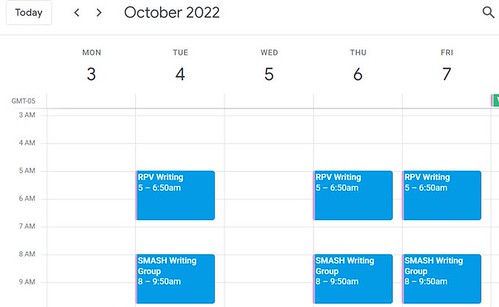There’s been a lot of discussion on Twitter over the past few days now from academics and tech people about calendars, synchronization and collaborative work, and I really don’t have the time to read them all but I wante to put in my two cents, so here it goes. In a previous life (I started working at a VERY young age and we won’t discuss child labor issues on here), I managed both my parents’ offices (they were lawyers). I wanted to gain administrative and management experience, in case, you know, I needed to find work to feed myself.
What I learned from managing my parents’ offices was that EVERYONE believes their issues are OF THE HIGHEST PRIORITY. So, I had to manage my parents’ schedule (which also had, you know, the personal life component) in a way that they had protected time for doing The Actual Work.
Negotiating calendars (specifically, appointments) is about negotiating PRIORITIES and AVAILABILITIES across multiple people. The problem is not whether or not you do “time-blocking” (blocking off time to ensure that you get work done). It’s that priorities shift even within the same day/hour.
 An example: this week, Mexico City has had several earthquakes. People evacuate, aided by a seismic alarm. During the period within which people evacuate their buildings and have to wait until they see if things are ok, their priority is knowing if their loved ones are safe.
An example: this week, Mexico City has had several earthquakes. People evacuate, aided by a seismic alarm. During the period within which people evacuate their buildings and have to wait until they see if things are ok, their priority is knowing if their loved ones are safe.
Priorities shift, all the time, and that’s not unique to academia. They shift in our personal lives, etc. This summer I spent THREE MONTHS sick with COVID, COVID sequelae and pneumonia. Was my work or academia itself a priority? NOT AT ALL. My priority was to get healthy again. Yes, I have time blocked for my writing (see photo). And most of the time, I DO use it for research (reading, writing, thinking, reflecting). But sometimes I have to re-prioritize this time because I have more urgent things to finish.
Priorities are not monolithic.
What *I* have found most useful whenever I have to negotiate meetings (and this does NOT mean in any way, shape or form that you must follow my strategy) is to socialize what my priorities are.
This quarter, my priorities are:
1) preparing well and teaching my two courses.
2) finishing outstanding writing commitments I have (including the very few peer reviews I accepted)
3) maintain my health
Everything else needs to be negotiated and renegotiated all the time. But I verbalize and share my priorities and my availabilities, ALL THE TIME.
For this to work, everyone needs to socialize their priorities and availabilities. A few friends of mine LOVE meetings in the morning. The morning is my best time for thinking and writing. But I compromise: if there is no other time for a meeting, I’ll move my writing elsewhere. I have several students about to finish their theses and defend them. Their degree completion becomes a higher-rank priority for me, so I make myself available at times that I probably would prefer to be writing, because they NEED to graduate, so again, I compromise. What I find important and useful and productive is that at all points, everyone involved in compromising and readjusting Priorities and Availabilities feels that the process is fair.
If I’m the only one compromising, I feel taken advantage of.
Calendar synchronization is a coordination problem, and this is precisely my area of scholarly specialization (coordination, collaboration and cooperation). What I find useful in achieving optimal results in coordination problems is clear communication and well-established rules.
Bottom line: how you negotiate your calendar is for you to decide, but it’s probably good to remember that Priorities and Availabilities are hard to align, and that if you want to make sure they do, you’ll need clear communication and well-established negotiation rules.



0 Responses
Stay in touch with the conversation, subscribe to the RSS feed for comments on this post.